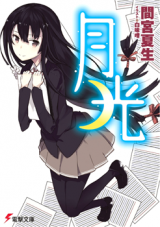Be aware that if we were only talking about literature, without taking into consideration how the prose is intentionally light and the whole light novel culture, I am unsure of what grade I would give this book. But nonetheless, my enjoyment of it was true no matter what I treat this work as.
Be it out of boredom or some slight interest accompanied by hope, I've been reading many Japanese light novels throughout the years. Having grown up with literature classics, I did mind the simplistic writings of these and how crude they could often be. I've only been seldom pleased by light novels, and there are only four cases I can quote, two of which should perhaps not count. The first such novel I ever enjoyed was No.6, but as far as I know it is not counted as a light novel and the only reason I would mention it is because it is related to mangas and annexed on mangaupdates. The second one is Rakuin no Monshou (Novel) but I only thought it succeeded at what the others failed and not at light literature. The third would be many Chinese and a few Korean novels for they have great story telling and such, but I like to think of them as another type of literature, and not really different from classics such as Xi Youji (A Journey to the West). But then, the morning of the day I am writing this review, I wished to check novelupdates for opinions of others on a certain Korean novel with moonlight in its title, and through my search of this single world I got to know Gekkou. And here ends my trip through Japanese light novels, for I have finally found a precious ore among mud.
I do happen to read even books simply because of their covers, and in this case it had both a nicely drawn and attractive cover along a really intriguing title, Gekkou meaning Moonglight. I had to check it and I did so eyes closed, without even reading its synopsis lest I would spoil myself my new discovery. I was not disappointed.
Gekkou is satisfying from the get go. Who among light novel mongers hasn't seen that stereotypical beginning with an ordinary school day, a protagonist complaining about his boring life, his friends and such, yet why does this novel make it different ? Simply because it's well written, and this is why I proclaim it as true light literature ! It's not just the rant of a lambda bored highschooler, it's about a being put into more words than that, it's about a life that's not limited by the word boring, and dialogues which aren't one sided from the author.
Narrated through the protagonist's cynical point of view, Mamiya Natsuki tells us a mystery story I found extremely great and refreshing, bringing originality even among western polars for I have never seen a similar story. The novel is the length of a typical book, being only a volume long, and while I do feel saddened at how there's neither any continuation or other work from the author, it certainly was the perfect length to conclude such a story, making it way greater than novels lasting tenth of times longer.
The words used are not complicated, the descriptions don't take much place, yet they are here when needed and they do manage to embellish the novel without making it any harder to read. The main character's thoughts are easy to follow and to relate to, but at the same time they are his own and can be doubted or disagreed with. Being a mystery novel, it of course manages to keep the reader intrigued about the events and ends things in a more than satisfying way. And what it does even better than mystery is its romance between the two main characters. For I who never liked that genre in books, this is certainly a first. The opposition between the main character and the heroine brings at the same time a special relation between them, but the enmity and doubt present all along makes it really interesting and the outcome hardly known without reading through the whole thing.
I'm truly glad to have found Gekkou, and I enjoyed it very much, maybe more than I should have. Be it the characters or the story, I liked them all and it had a great impact on me. Still, if it leaves the bitterness of finishing a good work, there's none of the unsatisfaction of a bad ending, or a not so good work. Still, it's unpleasant to know that, when eight out of ten people got a prize, this author didn't, although fortunately he was published, and that we haven't yet seen anything else from him apart from a Persona 4 fanwork.
Like another reviewer here had said, Gekkou should be the first title to come when recommending light novels. And I don't believe so only because it's the most fitting but by far the best I've read and a memorable one.






